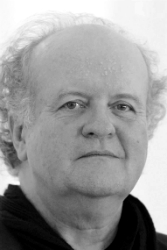Wolfgang Rihm
Lichtzwang | Four Poems from ‘Atemwende’ by Paul Celan
SETTING WORDS TO MUSIC: WOLFGANG RIHM ON ‘LICHTZWANG’
POETIC TEXT AND MUSICAL CONTEXT
From ‘Texte poétique et contexte musical’ in Wolfgang Rihm, Fixer la liberté ? Écrits sur la musique (Geneva: Editions Contrechamps, 2014). This excerpt translated from the French by Richard Jonathan.
The ‘epic’ character of a piece of music does not necessarily consist in the representation of an action that one could communicate verbally but rather in the transposition of certain principles of the unfolding of verbal action towards techniques of musical development.

Zong-De An, Le Temps, 2018

Zong-De An, Le Temps, 2010–19
In Lichtzwang for solo violin and orchestra, the second part of an attempt at a portrait of Paul Celan conceived as a cycle, I deliberately bring out this epic element. I take as my point of departure the kernel of a single word, Lichtzwang (‘light compulsion’), the title of a poetry collection by Celan and the central poetic notion of one of the poems. It concerns someone who cannot ‘darken over towards’ someone else when, or because, there reigns a ‘light compulsion’. This occurs against the background of an imaginary eulogy for the dead that I, struck by the suicide of the poet, dared to term ‘in memoriam’.
This was all the more an attempt to work in the epic register in that I tried, via the writing, to integrate the tone of a lament (the musical topos) in the situation of a ‘being under light compulsion’ (the verbal image). Moreover, I tried to do so—having considered this incapacity to ‘darken over towards someone’—by imagining all that, in true obscurity, still opposes one who accepts ‘light compulsion’ and who, though suffering from it, nevertheless speaks from that state.

Zong-De An, Le Temps, 2018–19

Zong-De An, Le Temps, 2018–19
That is why the role is given to a solo violin that a collectivity (I did not use the violins of the orchestra) first opposes and almost impedes, but then participates in its breakdown via a commentary in the form of a eulogy for the dead. From the point of view of the musical discourse, the growing solitude of the poetic voice—its decomposition, after an ‘arrival of light’, into isolated and increasingly incommensurable sentences, words and syllables—is concretely perceptible at the end of the work.
The obsessional character of both the eulogy for the dead and the violin/solo voice will have overcome that which surrounds it thanks to song. It then falls into the dissolution, indicated by unisons on C, of all sonorous individuality. These two processes—subjective eulogy for the dead and increasing solitude—occur simultaneously, one within the other; their identities as ‘poetic text’ and ‘musical context’ disappear in an amalgam in the epic register. The idea of ‘disappearance of one in the other’ is also expressed by the mixing of two genres, the concert and the cantata.

Zong-De An, Le Temps, 2009

Zong-De An, The Real, 2016
In Lichtzwang, text and music enter into a symbiotic relationship wherein music is indeed the external manifestation but it is the text that determines the internal life. This is probably one more proof of the impossibility of marrying music and text unless the two intertwine like arabesques around each other, forming a décor for one another, and the vibrations of their relationship become what we experience.
Note that, respecting the demands of plurivocity and univocity, vibrations always travel a two-way street: in one direction as sound, toward the exterior, and in the other direction as content, toward the interior. The boundaries fluctuate, yet we experience the transitions as ruptures because we lack the organ that can simultaneously apprehend an abstract conception as sensory experience and sensory experience as an abstract conception. And that is just fine. It means that it is we who remain in movement, it is we who—once music speaks to us or words move us—have to substitute for this impossible simultaneity a feeling of a distance travelled. In a word, it is we who, in linking the two, bring to life something new.

Zong-De An, Le Temps, 2008
SPOTIFY: WOLFGANG RIHM, IN DEN FLÜSSEN NÖRDLICH DER ZUKUNFT (ATEMWENDER I)
You can listen to the track in full with a registered Spotify account, which comes for free.
In den Flüssen nördlich der Zukunft
Paul Celan
In den Flüssen nördlich der Zukunft
werf ich das Netz aus, das du
zögerd beschwerst
mit von Steinen geschriebenen
Schatten.
In the rivers north of the future
Paul Celan, tr. R. Heinemann & B. Krajewski
In the rivers north of the future
I cast out the net, which you
hesitantly weight
with stone-written
shadows.

Wolfgang Rihm: Lieder | Richard Salter & Bernhard Wambach
WOLGANG RIHM WITH PAUL CELAN IN ‘MARA, MARIETTA’

Neysa Grassi, Warm Spring Rain, 2017
FROM ‘MARA, MARIETTA’
Part Ten Chapter 13
Tossing off three arpeggios, the pianist tosses me into expectation: I am a fisherman, casting out the net which you have weighted with stones. Hesitating, you wondered whether one more stone would be one too many, one less one too few: You have found the right tension, for in the clear water my net is suspended (the shadows of the stones tell me so). There is nothing to do now but wait. Listen: The music makes no claim to grasp meaning, the voice pursues its own phantoms. Before it’s over, Marietta, tell me: Why are you leaving me? Haven’t we been good at managing the distance that makes intimacy possible? Haven’t we found the right tension, the tension that allows us—time and time again—to sparkle in our self-becoming? Oh set your stones again, my love, the river has not yet reached the sea; let me cast the net again, beyond what you and I can see: Do you no longer have faith in me?
SPOTIFY: WOLGANG RIHM, LICHTZWANG
You can listen to the track in full with a registered Spotify account, which comes for free.

Tianwa Yang, violin

Wolfgang Rihm: Lichtzwang

Paul Celan
PAUL CELAN: LICHTZWANG
Translated by Michael Hamburger
From Poems of Paul Celan, translated by Michael Hamburger (NY: Persea Books, 1995) pp. 294-323
HÖRRESTE, SEHRESTE, im
Schlafsaal eintausendundeins,
tagnächtlich
die Bären-Polka:
sie schulen dich um,
du wirst wieder er.
SCRAPS OF HEARD, OF THINGS SEEN, in
Ward a thousand and one,
day-nightly
the Bear Polka:
you’re being re-educated
they’ll turn you back into he.

Hideaki Yamanobe, Scratch, 2012

Hideaki Yamanobe, Untitled, 2018
IHN RITT DIE NACHT, er war zu sich gekommen,
der Waisenkittel war die Fahn,
kein Irrlauf mehr,
es ritt ihn grad —
Es ist, es ist, als stünden im Liguster die Orangen,
als hätt der so Gerittene nichts an
als seine
erste
muttermalige, ge-
heimnisgesprenkelte
Haut.
NIGHT RODE HIM, he had come to his senses,
the orphan’s tunic was his flag,
no more going astray,
it rode him straight —
It is, it is as though oranges hung in the privet,
as though the so-ridden had nothing on
but his
first
birth-marked, se
cret-speckled
skin.
MIT MIKROLITHEN gespickte
schenkend-verschenkte
Hände.
Das Gespräch, das sich spinnt
von Spitze zu Spitze,
angesengt von
sprühender Brandluft.
Ein Zeichen
kämmt es zusammen
zur Antwort auf eine
griibelnde Felskunst.
HANDS
giving – given away,
larded with microliths.
The conversation that’s spun
from peak to peak,
scorched by
spume air from a fire.
A sign
combs it together
in reply to a
brain-racking rock art.

Hideaki Yamanobe, Scratch 2, 2018

Hideaki Yamanobe, Klangass. Ton Nr. 38, 2008
WE WERE LYING
deep in the macchia, by the time
you crept up at last.
But we could not
darken over to you:
light compulsion
reigned.
WIR LAGEN
schon tief in der Macchia, als du
endlich herankrochst.
Doch konnten wir nicht
hinüberdunkeln zu dir:
es herrschte
Lichtzwang.
WAS UNS
zusammenwarf, schrickt auseinander,
ein Weltstein, sonnenfern,
summt.
THAT WHICH
threw us together
startles apart,
a world-boulder, sun-remote,
hums.

Hideaki Yamanobe, Summer Night I, 2018

Hideaki Yamanobe, Daylight White 2, 2018
BEI BRANCUSI, ZU ZWEIT
Wenn dieser Steine einer
verlauten ließe,
was ihn verschweigt:
hier, nahebei,
am Humpelstock dieses Alten,
tät es sich auf, als Wunde,
in die du zu tauchen hättst,
einsam,
fern meinem Schrei, dem schon mit-
behauenen, weißen.
AT BRANCUSI’S, THE TWO OF US
If one of these stones
were to give away
what it is that keeps silent about it:
here, nearby,
at this old man’s limping stick,
it would open up, as a wound,
in which you would have to submerge,
lonely,
far from my scream, that is
chiselled already, white.
TODTNAUBERG
Arnika, Augentrost, der
Trunk aus dem Brunnen mit dem
Sternwürfel drauf,
in der
Hutte,
die in das Buch
– wessen Namen nahms auf
vor dem meinen? –,
die in dies Buch
geschriebene Zeile von
einer Hoffnung, heute,
auf eines Denkenden
kommendes
Wort
im Herzen,
Waldwasen, uneingeebnet,
Orchis und Orchis, einzeln,
Krudes, später, im Fahren,
deutlich,
der uns fährt, der Mensch,
der’s mit anhört,
die halb-
beschrittenen Knüppel-
pfade im Hochmoor,
Feuchtes, viel.
JETZT, da die Betschemel brennen,
eß ich das Buch
mit allen
Insignien.

Hideaki Yamanobe, Klangassoziationen Szene R 10/12, 2002

Hideaki Yamanobe, Scratch Flowing 3, 2010
TODTNAUBERG
Arnica, eyebright, the
draft from the well with the
star-crowned die above it,
in the
hut,
the line
– whose name did the book register before mine? –,
the line inscribed
in that book about
a hope, today,
of a thinking man’s
coming
word
in the heart,
woodland sward, unlevelled,
orchid and orchid, single,
coarse stuff, later, clear
in passing,
he who drives us, the man,
who listens in,
the half-
trodden fascine
walks over the high moors,
dampness, much.
Now that the hassocks are burning
I eat the book
with all its
insignia.
EINEM BRUDER IN ASIEN
Die selbstverkliirten
Geschütze
fahren gen Himmel,
zehn
Bomber gähnen,
ein Schnellfeuer blüht,
so gewiß wie der Frieden,
eine Handvoll Reis
erstirbt ais dein Freund.
FOR A BROTHER IN ASIA
The self-transfigured
guns
ascend to heaven,
ten
bombers yawn,
a quick-firing flowers,
certain as peace,
a handful of rice
unto death remains your true friend.

Hideaki Yamanobe, Scratch 08-4, 2008

Hideaki Yamanobe, Sunday ‘Memo: 02w-10 Daylight’, 2003
WIE DU dich ausstirbst in mir:
noch im letzten
zerschlissenen
Knoten Atems
steckst du mit einem
Splitter
Leben.
HOW YOU die out in me:
down to the last
worn-out
knot of breath
you’re there, with a
splinter
of life.
HIGHGATE
Es geht ein Engel durch die Stube –:
du, dem unaufgeschlagenen Buch nah,
sprichst mich
wiederum los.
Zweimal findet das Heidekraut Nahrung.
Zweimal erblalßts.
HIGHGATE
An angel has walked through the room –:
you, near the unopened book,
acquit
me once more.
Twice the heather finds nourishment.
Twice it fades.

Hideaki Yamanobe, Klangassoziationen Szene V 6/12, 2014

Hideaki Yamanobe, Landscape 08-01, 2008
ICH KANN DICH NOCH SEHN: ein Echo,
ertastbar mit Fühl-
wörtern, am Abschieds-
grat.
Dein Gesicht scheut leise,
wenn es auf einmal
lampenhaft hell wird
in mir, an der Stelle,
wo man am schmerzlichsten Nie sagt.
I CAN STILL SEE YOU: an echo
that can be groped towards with antenna
words, on the ridge of
parting.
Your face quietly shies
when suddenly
there is lamplike brightness
inside me, just at the point
where most painfully one says, never.
DIE EWIGKEITEN fuhren
ihm ins Gesicht und drüber
hinaus,
langsam löschte ein Brand
alles Gekerzte,
ein Grün, nicht von hier,
umflaumte das Kinn
des Steins, den die Waisen
begruben und wieder
begruben.
THE ETERNITIES struck
at his face and
past it,
slowly a conflagration extinguished
all candled things,
a green, not of this place,
with down covered the chin
of the rock which the orphans
buried and
buried again.

Elvire Ferle, Untitled 9, 1999

Elvire Ferle, Untitled 8, 2015
DIE IRIN, die abschiedsgefleckte,
behest deine Hand,
schneller als
schnell.
Ihrer Blicke Bläue durchwächst sie,
Verlust und Gewinn
in einem:
du,
augenfingrige
Ferne.
THE IRISHWOMAN, mottled with parting,
reads in your hand,
faster than
fast.
The blue of her glances grows through her,
loss and gain
in one:
you,
eye-fingered
farness.
KEIN HALBHOLZ mehr, hier,
in den Gipfelhängen,
kein mit-
sprechender
Thymian.
Grenzschnee und sein
die Pfähle und deren
Wegweiser-Schatten
aushorchender, tot-
sagender
Duft.
NO MORE HALF-WOOD, here,
on the summit slopes,
no col-
loquial
thyme.
Border snow and
its odour that
auscultates the posts
and their road-sign shadows,
declaring them
dead.

Elvire Ferle, Untitled 2, 2015

Elvire Ferle, Untitled 6, 2015
ORANIENSTRASSE 1
Mir wuchs Zinn in die Hand,
ich wulßte mir nicht
zu helfen:
modeln mochte ich nicht,
lesen mocht es mich nicht –
Wenn sich jetzt
Ossietzkys letzte
Trinkschale fände,
liß ich das Zinn
von ihr lernen,
und das Heer der Pilger-
stabe
durchschwiege, durchstünde die Stunde.
ORANIENSTRASSE 1
Tin grew into my hand,
I did not know
what to do:
I had no wish to model,
it had no wish to read me –
If now
Ossietzky’s last
drinking cup were found
I should let the tin
learn from that,
and the host of pilgrim
staves
would stone-wall, withstand the hour.
BRUNNEN-
artig
ins Verwunschne getieft,
mit doppelt gewalmten
Tagträumen drüber,
Quader
ringe
urn jeden Hauch:
die Kammer, wo ich dich liß, hockend,
dich zu behalten,
das Herz befehligt
den uns leise bestrickenden Frost
an den geschiedenen
Fronten,
du wirst keine Blume sein
auf Urnenfeldern
und mich, den Schriftträger, holt
kein Erz aus der runden
Holz-Lehm-Hütte, kein
Engel.
SUBMERGED
Well-
like into accursedness,
with doubly hipped
daydreams above,
ashlar
rings
around each breath:
the bedroom where I left you, crouching
so as to hold you,
the heart commands
the frost that gently captivates us
on the divided
fronts,
you will be no flower
on urn fields
and me, the script-bearer, no
ore releases from the round wood
and mud cabin, no
angel.

Elvire Ferle, Untitled 8, 2015

Elvire Ferle, Untitled 43, 2015
FAHLSTIMMIG, aus
der Tiefe geschunden:
kein Wort, kein Ding,
und beider einziger Name,
fallgerecht in dir,
fluggerecht in dir,
wunder Gewinn
einer Welt.
FALLOW-VOICED, lashed
forth from the depth:
no word, no thing,
and either’s unique name,
primed in you for falling,
primed in you for flying,
sore gain
of a world.
SPERRIGES MORGEN
ich beiße mich in dich, ich schweige mich an dich,
wir tönen,
allein,
pastos
vertropfen die Ewigkeitsklänge,
durchquäkt
von heutigem
Gestern,
wir fahren,
groß
nimmt uns der letzte
Schallbecher auf:
den beschleunigten Herzschritt
draußen
im Raum,
bei ihr, der Erd-
achse.
OBSTRUCTIVE TOMORROW
I bite my way into you, my silence nestles into you,
we sound,
alone,
pastily
eternity’s tones drip away,
croaked through by
the hodiernal
yesterday,
we travel,
largely
the last of the sonic bowls
receives us:
the boosted heart pace
outside
in space,
brought home to the axis
of Earth.

Albert Llobet Portel, Broken Lines II, 2013

John Richard Fox, Untitled 7902, 1979
STREU OCKER in meine Augen:
du lebst nicht
mehr drin,
spar
mit Grab
beigaben, spar,
schreite die Steinreihen ab,
auf den Händen,
mit ihrem Traum
streich über die
ausgemünzte
Schlifenbeinschuppe,
an der
großen
Gabelung er-
zahl dich dem Ocker
dreimal, neunmal.
SPRINKLE OCHRE into my eyes:
no longer
you live in them,
be sparing,
of graveside
supplements, be sparing,
walk up and down the stone rows
on your hands,
with their dream
graze the debased coinage,
the scale of
my temporal bone,
at the
great
road fork tell
yourself to the ochre
three times, nine times.
SCHALTJAHRHUNDERTE, Schalt-
sekunden, Schalt-
geburten, novembernd, Schalt-
tode,
in Wabentrögen gespeichert,
bits
on chips,
das Menoragedicht aus Berlin,
(Unasyliert, un-
archiviert, un-
umfürsorgt?
Am Leben?),
Lesestationen im Spätwort,
Sparflammenpunkte
am Himmel,
Kammlinien unter Beschuß,
Gefühle, frost-
gespindelt,
Kaltstart –
mit Hämoglobin.
LEAP-CENTURIES, leap-
seconds, leap-
births, novembering, leap-
deaths,
stacked in honeycomb troughs,
“bits
on chips”,
the menorah poem from Berlin,
(Unasylumed, un-
archived, un-
welfare-attended? A
-live?),
reading stations in the late word,
saving flame points
in the sky,
comb lines under fire,
feelings, frost-
mandrelled,
cold start –
with haemoglobin.

John Richard Fox, Untitled 7601, 1976

John Richard Fox, Untitled 7801, 1978
WIRK NICHT VORAUS,
sende nicht aus,
steh
herein:
durchgründet vom Nichts,
ledig allen
Gebets,
feinfügig, nach
der Vor-Schrift,
unüberholbar,
nehm ich dich auf,
statt aller
Ruhe.
DO NOT WORK AHEAD,
do not send forth,
stand
into it, enter:
transfounded by nothingness,
unburdened of all
prayer,
microstructured in heeding
the pre-script,
unovertakable,
I make you at home,
instead of all
rest.
VIDEO: WOLFGANG RIHM – 3 PIECES, 3 GENRES
Wolfgang Rihm: Klavierstück n°5 | Bertrand Chamayou, piano
Gesänge for voice and piano op. 1 | Johanna Vargas, soprano & Magdalena Cerezo, piano
Wolfgang Rihm: Gejagte Form (excerpt) | Ensemble intercontemporain















